You know that one of our specialties here at Hearts & Minds is books about spirituality, what some may call the contemplative lifestyle. From the monks to the mystics, Catholic and Orthodox ancients thru the Reformers, Puritans, revivalists, charismatics or the latest hip evangelicals, many authors have so much to teach us about our relationship to God. We opened our store carrying lots of Thomas Merton and early Henri Nouwen and the first few Richard Foster books (and some people, then, as now, accused us of all manner of nuttiness, pantheism and paganism and such.) In the 1980s we met new friends (and authors) who were Central Pennsylvania leaders in this field—I think of Kent Groff, who founded Oasis Ministries, and Russell Hart who still runs the Center for Spiritual Formation, known mostly among United Methodists, near here. And even this season, local friends continue to explore ways to help people with a more intimate relationship with God—our friend Deb Turnow and some other women we know are launching Kavannahouse in the York area.
Happily, mature and reliable books helping us attend to our interior lives and learn to practice spiritual disciplines and know God more deeply, are increasingly common and there are such books for nearly any reader, in nearly any style, theological tradition, or level of spiritual awareness.
We have often said that in our last decade, two books have really stood out for us as reliable,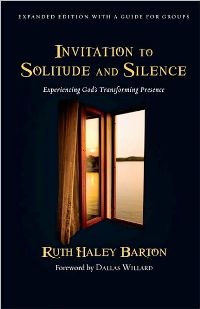 excellent, faithful guides into this tradition, and we are happy to say that the author of them both is also a friend — Ruth Haley Barton (of The Transforming Center in Wheaton, IL.) She has authored books for women (Longing for More), books about men and women in leadership together (Equal to the Task) and a few Bible studies.
excellent, faithful guides into this tradition, and we are happy to say that the author of them both is also a friend — Ruth Haley Barton (of The Transforming Center in Wheaton, IL.) She has authored books for women (Longing for More), books about men and women in leadership together (Equal to the Task) and a few Bible studies.
Her more recent and major works, though are Invitation to Solitude and Silence: Experiencing God’s Transforming Presence (IVP; $18.00) and Sacred Rhythms: Arranging Our Lives for Spiritual Transformation (IVP; $17.00) (which has now been made into a teaching DVD series that we raved about last fall.) These two titles are ones about which I often speak, thinking they are truly must-reads. They are very nicely done, quite balanced (that is, she strikes a reasonable and moderate tone, nothing too arcane or mystical and yet not too pedestrian) and nicely written.
Next, Haley Barton offered yet another layer of insight—giving us a book that, unlike these previous ones, is almost one of a kind. Strengthening the Soul of Your Leadership: Seeking God in the Crucible of Ministry (IVP; $18.00) invites pastors, church and para-church leaders, and, really any busy person of influence, to relate the spiritual disciplines to their pace of life in leadership. By studying Moses, Ms Barton gently teaches us how (and why!) to integrate spiritual practices into the grueling tasks of leadership. One section in that important book is about how leaders must practice the spiritual habit of seeking God’s will, discerning what is life-giving and true, and resisting any other choices and decisions that, driven by ego or false values, derail us from living and leading with Spirit-lead authenticity. I don’t know for sure, but I bet a number of readers read that and hungered for more. I know I did.
A MUCH-NEEDED MASTERPIECE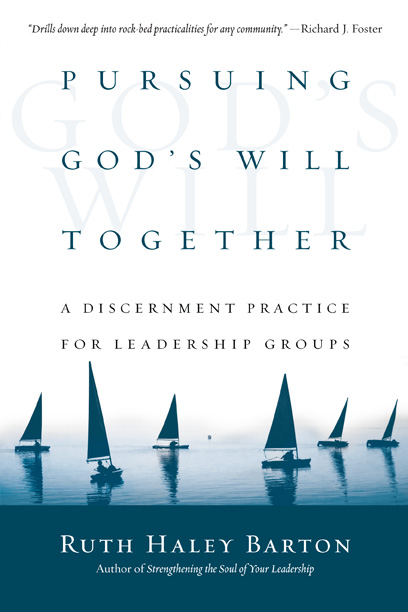 I suppose I can’t say that the brand new release Pursuing God’s Will Together: A Discernment Practice for Leadership Groups (IVP; $20.00) is “the book Ruth was born to write.” That sounds grandiose (and her humble nature wouldn’t want that) and it may suggest the other books aren’t fully excellent, which, as I have said, I think they are. And who knows what she may write next? 

But for now, this is her masterpiece, an amazing work that, while a bit more limited in scope than her previous ones (it is for leaders and about doing this work of formation together) is nonetheless a must-read for anyone who is serious about important contributions by contemporary contemplative writers. If you like Richard Rohr or Dallas Willard, David Benner or Joan Chittister, Gary Thomas or Parker Palmer, Thomas Keating or Richard Foster, Ronald Rohlheiser or Phyllis Tickle, I’m insisting that Ruth Haley Barton should be considered in this wise and august contemporary company. And this book is a must.
I suppose I can’t say that the brand new release Pursuing God’s Will Together: A Discernment Practice for Leadership Groups (IVP; $20.00) is “the book Ruth was born to write.” That sounds grandiose (and her humble nature wouldn’t want that) and it may suggest the other books aren’t fully excellent, which, as I have said, I think they are. And who knows what she may write next? 

But for now, this is her masterpiece, an amazing work that, while a bit more limited in scope than her previous ones (it is for leaders and about doing this work of formation together) is nonetheless a must-read for anyone who is serious about important contributions by contemporary contemplative writers. If you like Richard Rohr or Dallas Willard, David Benner or Joan Chittister, Gary Thomas or Parker Palmer, Thomas Keating or Richard Foster, Ronald Rohlheiser or Phyllis Tickle, I’m insisting that Ruth Haley Barton should be considered in this wise and august contemporary company. And this book is a must.
Ideally, this is a book written for those in congregational or para-church leadership, and it is designed to be read together as a group with other leaders. If you have a leadership team, a church council, elder board, consistory, session, Board of Directors; if you work with deacons, volunteer staff, or an accountability group, this book is for you and for them.
However, if you don’t have a willing crew, read it yourself anyway. I can’t tell you how much you will gain from it, how much you will learn, and how you will be invited into a style of life, decision making, habits and instincts that will be formed by the ways of God’s good grace. Reading this has been very helpful for me, although (I will say, in case Ruth or others who know me best are reading over our shoulder) it remains to be seen how I will apply it all. Step by step we live into our deepest ways of knowing, and learn to trust God to make ways for us and work ways in us to mature in life-giving and Spirit-lead habits. I have a long way to go on this journey, and this book is going to be a guide along this leg of it. And I’m not even on any leadership team.
DISCERNMENT NOT DECISION-MAKING
Here is the thesis of the book in a nutshell: we are not at our faithful best when we make decisions like the world does: Romans 12: 2 directly tells us to reject certain things in order to discern what is good. We must be formed in the ways of Christ in order to resist false values, weird instincts, dysfunctions and drives that come from ego, sin, hurt, or any number of less than healthy motivations.
We can learn to say “no” to typical decision making approaches (both in our own personal styles and habits and in our corporate cultures and practices) and replace such wooden and often (finally) ineffective ways with what is called discernment. We enter into a process of hearing the Spirit’s voice, of determining in our hearts what is good, of seeking God’s will, of framing our choices in light of Biblical truth and of Christ’s own redemptive love for the world.
She is kind but blunt; we tend to hire and promote and raise up volunteers to run churches and ministries and faith-based organizations who are, well, schooled in the first model of decision-making and less than apt to know anything about holy discernment. This is the purpose of her book, helping us realize that our decision making styles and our corporately arranged boards and our Roberts Rules of Order-shaped ethos isn’t consistent with a Biblical vision and isn’t congenial towards those who really want to discern God’s will and seek God’s desires. Those who have learned a lot from the latest New York Times business section bestseller about getting things done or
who have been formed in the culture of efficiency and success in the corporate world may be devout and fine Christians. They may have strong skills that are useful, even in church. But they will need to do some serious heart work if they are going to be members of a discerning community that leads a ministry in fruitful and Godly ways.
Can folks who are schooled and skilled in wielding worldly leadership shift their paradigm, as they say, to adopt this spiritual discernment model? Can power brokers learn to pray? Can committees, or even teams, becomes communities?
I might have been too quick to say yes to this before reading Ruth’s manuscript. When I first started thinking about these things I was influenced by the great work of Elizabeth O’Connor and Gordon Cosby, who founded Church of the Savior in Washington, DC. Sure, I figured, we can do this! Now, I think I have a bit more sanguine, as it really is difficult. We need help. Geesh, I hate to sound like a salesman, but with Ruth’s guidebook, I think it can be done. But we are fooling ourselves if we think that we can nurture authentic community based on the habits of prayerful discernment without this sort of of instruction and guidance. I would almost say without doubt that your church or organization, like mine, needs this book.
(There are other good books on this topic, too. I list a few below.)
THREE HELPFUL FEATURES
Ruth explains her thesis much better than I have above, but I trust you get the point. To make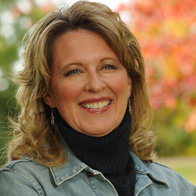 this a very usable resource, the book has three great features that help groups process this material.
this a very usable resource, the book has three great features that help groups process this material.
Firstly, scattered throughout there are just a few well-placed pull out boxes that contain good questions for individual reflection. She offers a few thoughtful questions that surely illustrate that she has worked on this stuff with others; these are not mundane or toss-off questions that some assistant filled in to make the book seem more usable. These are key aspects of the journey and I can vouch that pondering them will take some time and some candor. As spiritual leaders (from Julian of Norwich to John Calvin to Gerald May) have long said, a good part of spirituality is self-awareness. As we come to know who we are in Christ, as we are attuned to our true selves as made in God’s image and beloved of God, we are able, then, to resist what the New Testament bluntly calls our “sin nature.” Yep, a bit of interior work about our self-knowledge is a foundational spiritual practice and engaging these kinds of honest, reflective questions is fruitful for anyone on a spiritual journey.
Secondly, there are exercises for groups, really helpful stuff to allow boards or councils or teams to actually learn to become communities. As these group exercises are pursued, I can only imagine, friendships will deepen, conversations will take on a more intentionally spiritual and missional focus, and the hard work of doing life together will begin (or deepen.) This isn’t a workbook, but these brief meditations and group discussion pieces allow the book to be used with your own leadership folks. There is a good closing prayer for each session. It could be used over several months, on a retreat, or in other intentional spaces carved out to work on this. Believe me, I read a lot of books about congregational renewal, church revitalization, revival and the like. This is superb. It is radical, but doesn’t feel extreme. It is orthodox, but could be used by all sorts of churches, liberal or conservative. It is deep, but doesn’t feel mystical or too touchy-feely. This is, it seems, what a spiritually alive and discerning community growing in authentic Christian leadership looks like.
Thirdly — and this is both fun and instructive — there is a fictional narrative running through the book, chapter by chapter. A stressed out team at a growing, good congregation, starts to hunger for deeper, Godly formation, they go on a retreat and hear some of this stuff, they take up their own commitments to spiritual disciplines, and enter into intentional efforts to be the leadership community their church needs them to be. This little device is captivating and (how do I say this delicately?) I think she knows what she’s talking about. These are composites, stories she has experiences or heard in her own career, among her own team, and seen in her own church consulting and spiritual direction. This is good stuff, interesting, candid, and I think very, very helpful.
IT STARTS WITH YOU The first part of the book makes an obvious claim, and she shares it unequivocally. For any faith group to become a spiritual community practicing discernment each member of said community must themselves be well rehearsed in this spiritual practice. She alludes to the “bus” metaphor–that is, getting the right people on–from the famous leadership work of Jim Collins. She seems to suggest that practicing spiritual formation disciplines as a community, though, will prevent leaders from distrusting one another no one will be trying to throw anyone else under the bus. But of course, as noted above, even one leader who “doesn’t get it” or is resistant to entering this new (old) way of Christian leadership, may spoil the whole project. Getting each person on board, and securing commitments to this contemplative way of life from the leaders themselves is essential.
The first part of the book makes an obvious claim, and she shares it unequivocally. For any faith group to become a spiritual community practicing discernment each member of said community must themselves be well rehearsed in this spiritual practice. She alludes to the “bus” metaphor–that is, getting the right people on–from the famous leadership work of Jim Collins. She seems to suggest that practicing spiritual formation disciplines as a community, though, will prevent leaders from distrusting one another no one will be trying to throw anyone else under the bus. But of course, as noted above, even one leader who “doesn’t get it” or is resistant to entering this new (old) way of Christian leadership, may spoil the whole project. Getting each person on board, and securing commitments to this contemplative way of life from the leaders themselves is essential.
She says this plainly; gently, but firmly. I think it could have been said even more strongly, as in many churches we elect the smartest, the richest, the keenest, or the most efficient (or, maybe, just the most willing) without adequate discernment of their spiritual capacity for offering distinctively Christian thinking or radically faithful discipleship. We should seek spiritual leaders who are, well, walking the walk, running the race, being led by the Spirit. Who know well the One they pray to. Ruth’s book warns against selecting the wrong sorts of leaders, but she is also upbeat: God can transform any who are even somewhat willing. New ways can be learned, deeper paths
can be trod, pushy and cantankerous meetings can be softened and Godly leaders can relearn communal ways that are honoring to God and attentive to the voice of the Spirit.
She writes,
Such individuals do have valuable gifts to bring to the
leadership setting, and our churches and organizations would be
impoverished without them. The problem, however, is when individuals
bring only the training, experience, and influences of the
secular mindset without preparation in the areas of spiritual
discernment… The next step to becoming a leadership group that
discerns God’s will together is to cultivate a shared, working knowledge
of the basics and to begin (or make sure people are) practicing
discernment in their own lives. When even one person in the group is not
habitually practicing discernment, it can derail the best attempts of
the whole group.
And so, the first three or four chapters of this book again invite us to live the spiritual life, to embrace new habits and disciplines, to carve out time for solitude and silence. She insists that God’s Spirit helps move us from blindness to sight; that is, we are being healed and changed and transformed. Do your own spiritual practices, you quiet time with God, your practicing the presence, cause transformation in you and your world? Shouldn’t it? Can we be a bit more intentional so we can make space for God to do God’s thing in and with and through us?
In a way, these first chapters are refresher courses–and don’t we need them?—from her previous three books. (The third chapter is called “The Discerning Leader.”) But they do not feel perfunctory or rehashing. This is new material, strong and helpful and very moving.
So she has moved from the basics of spiritual formation to the way in which leaders, especially, are called to practice spiritual disciplines. We have to bring our own lived experience of God and our intimate walk with Christ to the leadership table. Excellent.
Next, Barton tackles the shift from teams to community, making the case that our leaders should be about forming communities of discernment. Yes, yes, this is the big theme, the point of the book. But first, at least, we must become more than committees or boards. We must become relational communities. Chapter Five, “Values That Undergird Community” — starting with a quote from Dietrich Bonhoeffer’s Life Together—has in about 25 pages more solid content and usable reminders than any book like this I’ve read in a while. Again, while I pray that many congregations read it and take it to heart, I think this is good stuff for anyone—with insights to enhance your family, your workplace, your small group, your circle of best friends. This is solid, helpful stuff.
The book offers exceptional insight and practical advise in the next three chapters, chapters that help us move towards the goal of being communities of safe discourse and Godly discernment. These chapters are “Practices for Opening to God Together,” “Practices for Listening to Each Other,” and “A Covenant That Protects Community.” These three core chapters themselves deserve more comment, but you can see they are practical and necessary.
PRACTICING DISCERNMENT TOGETHER
The final four chapters — not quite 100 pages — make up the second portion of the book, Part Two. Ruth’s experience in teaching this is evident here as she cuts to the chase and teaches us so very much. The chapter titles:


Get Ready: Preparing for the Discernment Process
Get Set: From Decision Making to Discernment
Go! Discerning and Doing God’s Will Together
But Does It Work?
Lastly, there is a small leaders guide (more insight about using the community sessions scattered throughout the book) and a bit of a Bible study on spiritual transformation. Lastly there is an appendix on Lectio Divina. (She has a whole chapter on this creative practice of meditation on the Scriptures and allowing the Spirit to guide you to contemporary application in her book Sacred Rhythms, by the way.)
 down-to-earth writing, good humor and abiding commitment to a solid Biblical framework. We do not need deep mystical innovations, odd-ball psychological stuff or navel-gazing being passed off as the latest gimmick or formula. Gnostism and other esoteric heresies creep into well-intentioned talk of inner truths. Barton is grounded in the ancient catholic traditions, writes in a refreshingly ecumenical tone, but is solidly evangelical, and has fabulous Bible study in most sections. She is a good teacher, and her experience with her own Transforming Center ministry and as consultant to many congregations and with many, many pastors and ministry leaders, has positioned her to be a voice we should heed.
down-to-earth writing, good humor and abiding commitment to a solid Biblical framework. We do not need deep mystical innovations, odd-ball psychological stuff or navel-gazing being passed off as the latest gimmick or formula. Gnostism and other esoteric heresies creep into well-intentioned talk of inner truths. Barton is grounded in the ancient catholic traditions, writes in a refreshingly ecumenical tone, but is solidly evangelical, and has fabulous Bible study in most sections. She is a good teacher, and her experience with her own Transforming Center ministry and as consultant to many congregations and with many, many pastors and ministry leaders, has positioned her to be a voice we should heed.I am encouraged by this this wonderful resource and hope my explanations–which don’t capture the faith and passion and excitement and common sense of all this—somehow help folks realize how useful this book can be. I hope you consider ordering it, maybe even sharing it with leaders in your own congregation or fellowship group. We commend it to you with great joy and with great expectation. This, friends, can rock your church or organization. We can, in discerning God’s ways, be more fruitful and faithful. And that can change the world.
Here are a few other books I notice on our shelves about this subject of discernment. There are more, but these are good. The first few are for personal practice, the next about congregational or group discernment. The last two are about church renewal, but learning communal discernment is central to their proposals. Very nice.
The Way of Discernment: Spiritual Practices for Decision Making Elizabeth Liebert (Westminster/John Knox) $17.00
Decision Making and Spiritual Discernment: The Sacred Art of Finding Your Way Nancy Bieber (Skylight Paths) $16.99
The Discernment of Spirits: An Ignatian Guide for Everyday Living Timothy M. Gallagher (Crossroad Publishing Company) $24.95
Discerning the Will of God: An Ignatian Guide to Christian Decision Making Timothy M. Gallagher (Crossroad Publishing Company) $16.95
Transforming Church Boards into Communities of Spiritual Leaders Charles Olsen (Alban Institute) $17.00
Discerning God’s Will Together: A Spiritual Practice for the Church Charles Olsen & Danny Morris (Upper Room) $15.00
Selecting Church Leaders: A Practice in Spiritual Discernment Charles Olsen & Ellen Morseth (Alban Institute) $14.00
Practicing Discernment Together: Finding God’s Way Forward in Decision Making Lon Fendall, Jan Wood, Bruce Bishop (Barclay Press) $16.00
Listening Hearts: Discerning Call in Community Suzanne Farnham, Joseph Gill, Taylor R. McLean, Susan Ward (Morehouse Publishing) $14.00
Grounded in God: Listening Hearts Discernment for Group Deliberations (revised) Suzanne Farnham, R. Taylor McLean, Stephanie Hull (Morehouse Publishing) $14.00
Springs of Living Water: Christ Centered Church Renewal Miller David S. Young, forward by Richard Foster (Herald Press) $16.99
Becoming a Blessed Church: Forming a Church of Spiritual Purpose, Presence, and Power Graham Standish (Alban Institute) $18.00
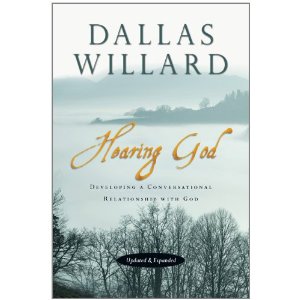 Hearing God: Developing a Conversational Relationship with God (updated & expanded) Dallas Willard (IVP) $17.00 Ruth Barton of course is not the only evangelical writer who has written wisely about deep spiritual matters and is not the only one advising that we listen to God. I hope some of the diverse books listed above strike your interest.
Hearing God: Developing a Conversational Relationship with God (updated & expanded) Dallas Willard (IVP) $17.00 Ruth Barton of course is not the only evangelical writer who has written wisely about deep spiritual matters and is not the only one advising that we listen to God. I hope some of the diverse books listed above strike your interest.
Seeking and following God’s will has long been a preoccupation amongst evangelicals, especially, and hearing God’s voice is a longing felt all across time and around the world. Sadly, there are terrible books about this, both about the very notions of God’s will and about the ways in which we can and cannot “hear God’s voice.” It is, surely, a sticky topic.
For many of us, such notions about finding and following God’s perfect will conjures up pretty scary stereotypes and pretty weird religiosity. Old Testament scholar Bruce Waltke has shown [Finding God’s Will? A Pagan Notion? (Eerdmans; $17.00)] that some ideas about this are outright pagan. So we need help, and we need reliable, vibrant insight.


I simply know of no better serious book on this matter than this wonderful, best selling resource by the profound and thoughtful scholar, Dallas Willard. Willard certainly calls us to be transformed into the ways of Christ, and, although a philosopher (he teaches at University of Southern California) he has a gentle and insightful manner to guide us into these vexing matters. But he is a philosopher, so be prepared to cover a lot of bases.(You can explore all manner of things at his webpage, here. )
Many of you know this book. Richard Foster has written that it is “the best book on divine guidance I have ever read. I recommend it highly.” I am happy to report that we stock this very handsome new edition—again, kudos to the formatio publishing imprint of InterVarsity Press for doing the most readable and sound books of this kind. (We carry every book in the formatio line, by the way.)
This updated version includes new material from the author’s teaching at the Renovare Institute. There is a new Q & A section and a fabulous index showing where to find answers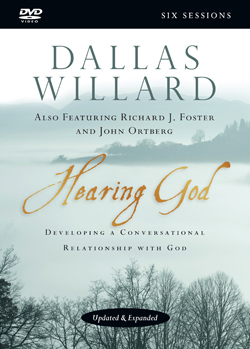 to key questions in the text itself. There are six lectio divina exercises placed throughout the book, too, to help you train your ear to experience hearing God in appropriate ways.
to key questions in the text itself. There are six lectio divina exercises placed throughout the book, too, to help you train your ear to experience hearing God in appropriate ways.
There is also a brand new six session companion Hearing God DVD (IVP; $30.00) which would make a great adult ed class or small group study for anyone seriously interested in the deeper life, our struggle to discern God’s ways, and how we can, by hearing God’s voice, partner with Christ in the work of His Kingdom. As you can on the DVD case, it also featured his friends Richard Foster and John Ortberg.
Excellent, well produced, very inspiring, for anyone.


DISCOUNT
any book mentioned
2O% off
order here
takes you to the secure Hearts & Minds order form page
just tell us what you want
inquire here
if you have questions or need more information
just ask us what you want to know

Thanks, Byron, for such a gracious and thoughtful review of my book. You are truly an author’s best friend! Your ministry of books is so much more than just selling; you read thoroughly enough to capture and communicate about the metamessage of a work plus the finer nuances. In so doing, you serve us all. What a blessing!